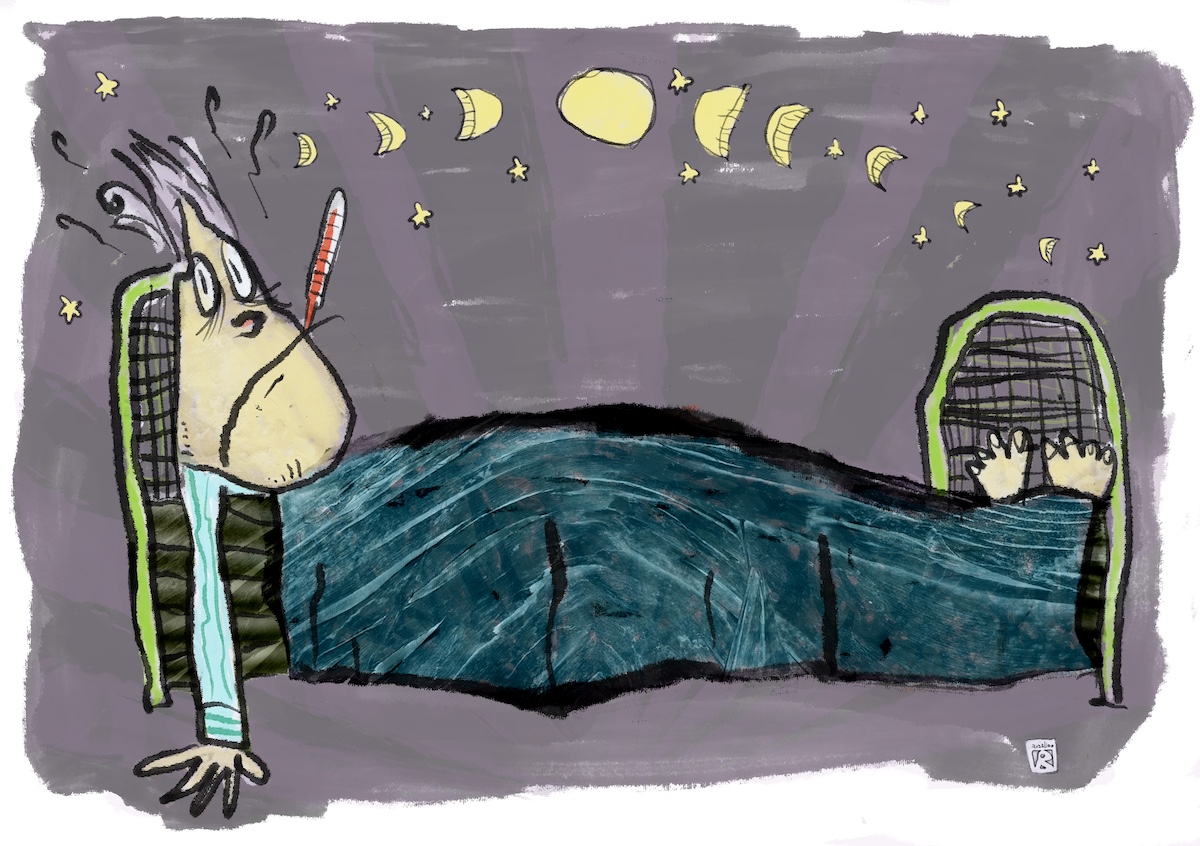 Health & Physiology
Health & Physiology
Deep brain-mediated effects of stress on sleep and immunity
Stress is among the most prevalent causes of insomnia, yet why the brain fails to manage a heathy and proper sleep pattern under stress remains unclear. We clarified a neural circuit located in the deep brain regions implicated in stress-induced insomnia and an extensive suppression of immune function.

The brain is formed with a constellation of various types of neurons interacting with internal milieu and external surroundings in a dynamic manner. Sleep occupies one-third of one’s lifetime and a good night’s sleep is vital for survival. Living in a fast-paced modern society, people usually experience stress which is likely associated with acute for chronic problems in sleep. It has been reported that about 30% of adults exhibit symptoms of insomnia. Despite the high prevalence of stress-induced insomnia, how sleep is dysregulated under stress remains unclear.
We studied the underpinnings of stress-induced insomnia in laboratory mice. We revealed that two neuronal clusters, one cluster secreting stress hormone (stress neuronal cluster/SNC), and the other cluster secreting wake-promoting neuropeptides (wake neuronal cluster/WNC), were labeled with neuronal activity marker in response to stress exposure. Then, we identified a neural circuitry physically linking the SNC to WNC. This evidence suggests their potential involvement in hyperarousal/insomnia driven by stress.
We then monitored their spontaneous activity across natural sleep/wake cycles. The SNC exhibited minimal changes among different behavioral state transitions indicating the stress modulation center SNC is unlikely implicated in controlling natural sleep/wake transitions. On the other hand, the WNC activity was associated with natural wakefulness. To examine their responses to external inputs, we then subjected the mice to various salient stimuli involving novelty, social, appetitive, and aversive components. Interestingly, the restraint stress elicited maximal activity in the SNC and WNC.
Although both of them were recruited by stress to mediate hyperarousal, is the activity of either sufficient to cause insomnia? We artificially activated either SNC or WNC to dissect their power in maintaining wakefulness. With the same activation strength, we observed insomnia-like behavior through stimulating the SNC but not the WNC suggesting the SNC is powerful in keeping the mice in persistent wake reassembling insomnia. How about disturbing either node? Is the same activation still sufficient in keeping the animals in an insomnia-like state? We then disrupted the expression of stress hormone gene of cells in the SNC, and surprisingly the same activation did not cause hyperarousal indicating the stress hormone plays an essential role in stress-induced hyperarousal. On the other side, while we genetically ablated the WNC, the same stimulation of SNC projecting to the WNC field generated wakefulness with a level much lower than stimulating the intact circuitry. Therefore, the stress hormone is the catalyst for persistent wakefulness in stress-induced insomnia/hyperarousal.
Will the sleep patterns of mice after exposure to restraint stress be different if we artificially disrupt either node of the SNC-WNC circuitry? We then subjected mice with intact SNC-WNC connection, or either with stress hormone gene disrupted or WNC ablated, to restraint stress and compared their sleep patterns. We found either the stress hormone gene disruption or genetic ablation of WNC significantly reduced the latency to non-rapid eye movement sleep (the major component of sleep) onset. With this set of experiments, we demonstrated that the SNC-WNC circuitry plays a critical role in stress-induced insomnia/hyperarousal.
Empirically, acute stress appears to prime immunity, whereas chronic stress usually suppresses immune function. To figure out the functional role of this brain circuitry in the modulation of immunity, we collected blood samples after stimulating the SNC with a strong activation paradigm and ran a comprehensive analysis of immune factors in their blood samples. We found that strong activation of SNC drives changes in systemic immunity indicating suppression of immune function, including dynamic changes in immune cell distribution and functional responses.
Together, our work identified substrates in the brain for insomnia and immunosuppression due to activation of two neuronal clusters located in deep brain regions orchestrating responses to stress exposure. While seeking for treatments of insomnia associated with debilitating immune function induced by excessive stress, the deep brain pathway SNC→WNC may be considered as a potential treatment target in clinical practice.
Original Article:
Li, S. et al. Hypothalamic circuitry underlying stress-induced insomnia and peripheral immunosuppression. Science Advances 6, (2020)Next read: Where mind meets body: a master brain circuit for stress responses by Naoya Kataoka , Kazuhiro Nakamura
Edited by:
Isa Ozdemir , Senior Scientific Editor
We thought you might like
Mindfulness yoga relieves anxiety and depression for Parkinson’s patients
Dec 20, 2019 in Neurobiology | 3 min read by Jojo Y. Y. Kwok , Leo C. C. LamOur cell's “protein factory” can decrease fats to promote lifespan
Sep 18, 2020 in Health & Physiology | 3.5 min read by Ryo Higuchi-SanabriaMore from Health & Physiology
How obesity can improve the efficacy of cancer treatment: role of the sex hormone estrogens.
Dec 3, 2025 in Health & Physiology | 3.5 min read by Eloïse Dupuychaffray , Carole BourquinTobacco smoking and other exposures shut off cancer-fighting genes
Aug 31, 2024 in Health & Physiology | 3 min read by Jüri Reimand , Nina AdlerA hidden clock that times cytoplasmic divisions
Aug 30, 2024 in Health & Physiology | 3 min read by Cindy OwWhen two kinases go for a dance
Aug 2, 2024 in Health & Physiology | 4 min read by Ioannis Galdadas , Francesco Luigi Gervasio , Pauline JuyouxAwakening the thymus to cure SARS-CoV-2 infection: a matter of genes
Jul 27, 2024 in Health & Physiology | 3.5 min read by Stefano Marullo , Cheynier RemiEditor's picks
Trending now
Popular topics


